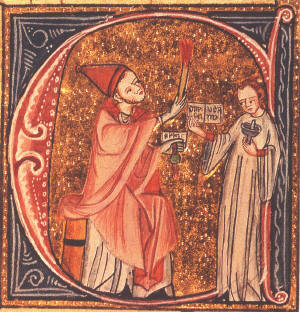 The figures of the medieval period in church history
The figures of the medieval period in church history
is not high on many today. Issues of ecclesial reform and religious liberty
during the 11th century are resonant today. Liturgically the Church recalls one
of the popes who worked for reform and religious freedom: Pope Saint Gregory
VII. The Tuscan pope was born between 1020 and 1025 and bore the name of
Hildebrand. Reliable facts of his Hildebrand’s life are obscure but we know his
uncle Laurentius was abbot of a Roman monastery, where he engaged his
education. Monasteries were great centers of education and culture.
Hildebrand’s ecclesial service included monastic profession; chaplain to his mentor John Gratian who became Pope Gregory VI. By 1046, Hildebrand was with Gregory when he was forced to resign from the Papacy. The pope appointed him an abbot of a monastery that needed reform before being appointed a cardinal. He put off his brother cardinals from electing him to the papacy for several years until April 1073, when Hildebrand was elected the Bishop of Rome taking the name of Gregory VII. The new pope was recognized as being “a devout man … mighty in human and divine knowledge, a distinguished lover of equity and justice, a man firm in adversity and temperate in prosperity.” Gregory was a man true to his principles led him to end his days in exile for what he believed was true, good and beautiful. He is reported to have said that, “I have loved justice and hated iniquity, therefore I die in exile.”
If people think that problems in the Church today are monumental, Gregory VII faced a church that was renown for scandalous clerical corruption, blossoming schism between the churches of Rome and Constantinople, and problems with civil rulers who claimed for themselves the right to appoint the Church’s leadership and control church’s properties. 1074 is a monumental year for change; and despite resistance, the Gregory was resolved with ecclesial and civil authorities, even to the point of excommunicating the German Henry IV.
When a pope excommunicates an emperor it is not good for the nation. Henry’s subjects were forbidden to obey Henry. Unsettled by it all, in 1077 things came to a head when Gregory accepted Henry’s penitence by spending three days waiting in the snow before being reconciled. It is a famous image in history. Henry’s penitence didn’t last long. He was excommunicated again for supporting an anti-pope.
Gregory died in Salerno on May 25, 1085. Gregory VII was canonized by Benedict XIII in 1728.
Saint Gregory, pray for us.
One last thing. We don’t often read the decrees of excommunication but it is interesting to see what done years ago:
O St. Peter, chief of the apostles, incline to us, I beg, your holy ears, and hear me your servant whom you have nourished from infancy, and whom, until this day, you have freed from the hand of the wicked, who have hated and do hate me for my faithfulness to you. You, and my mistress the mother of God, and your brother St. Paul are witnesses for me among all the saints that thy holy Roman church drew me to its helm against my will; that I had no thought of ascending thy chair through force, and that I would rather have ended my life as a pilgrim than, by secular means, to have seized thy throne for the sake of earthly glory. And therefore I believe it to be through your grace and not through my own deeds that it has pleased and does please you that the Christian people, who have been especially committed to you, should obey me. And especially to me, as your representative and by your favor, has the power been granted by God of binding and loosing in Heaven and on earth. On the strength of this belief therefore, for the honor and security of your church, in the name of Almighty God, Father, Son and Holy Ghost, I withdraw, through your power and authority, from Henry the king, son of Henry the emperor, who has risen against your church with unheard of insolence, the rule over the whole kingdom of the Germans and over Italy. And I absolve all Christians from the bonds of the oath which they have made or shall make to him; and I forbid any one to serve him as king. For it is fitting that he who strives to lessen the honor of thy church should himself lose the honor which belongs to him. And since he has scorned to obey as a Christian, and has not returned to God whom he had deserted — holding intercourse with the excommunicated; practicing manifold iniquities; spurning my commands which, as you do bear witness, I issued to him for his own salvation; separating himself from your church and striving to rend it — I bind him in your place with the chain of the anathema. And, leaning on you, I so bind him that the people may know and have proof that you are Peter, and above your rock the Son of the living God has built His church, and the gates of Hell shall not prevail against it.
from Gregory VII, Reg. III, No. 10 a, translated in Ernest F. Henderson, Select Historical Documents of the Middle Ages, (London: George Bell and Sons, 1910), 376-377